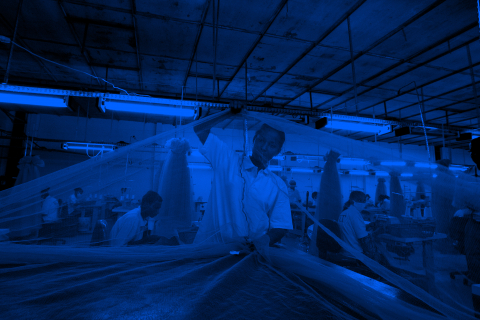Geneva, 9 April 2020--The ongoing COVID-19 pandemic places an extra burden on health systems worldwide, and especially in countries with fragile health systems. Many countries, particularly in sub-Saharan Africa which accounts for more than 90% of global malaria cases and deaths, are facing a double challenge of protecting their citizens against existing and emerging threats to public health.
The RBM Partnership to End Malaria is working to ensure that efforts to limit the spread of COVID-19 do not compromise access to malaria prevention, diagnosis and treatment services, which are saving almost 600,000 lives and preventing nearly 100 million infections each year. Our top priority is to ensure the supply of vital malaria control tools used to protect millions of people across the world, particularly in countries with a high burden of the disease, as well as their safe delivery, including availability of personal protective equipment (PPE) for frontline health workers.
Working in close partnership with the World Health Organization (WHO), the Global Fund to Fight AIDS, Tuberculosis and Malaria, and malaria-affected countries, we are closely monitoring the situation to address possible disruptions in the supply chains of essential malaria commodities—such as insecticide treated nets (ITNs), rapid diagnostic tests (RDTs) and antimalarial medicines—resulting from lockdowns and restrictions on the importation and exportation of goods in response to COVID-19.
The development and the scale-up of ITNs is responsible for nearly 70% of malaria cases prevented in Africa since 2000. Earlier this year, global malaria partners have celebrated the delivery of the 2 billionth life-saving mosquito net on the continent since 2004. The RBM Partnership strongly encourages countries not to suspend the planning for or implementation of vector control activities, whilst, of course, taking all necessary precautions against spreading infection. The Alliance for Malaria Prevention, a coalition working under the auspices of the RBM Partnership, has just released its guidance on safe distribution of insecticide-treated nets in COVID-19 affected countries.
In recent days, there has also been increasing attention on the issue of availability of antimalarial medicines, notably chloroquine and its derivative, hydroxychloroquine, which have been eyed as potential treatments for COVID-19 however are not currently approved by WHO for this purpose.
Chloroquine and hydroxychloroquine have not been used widely for treating malaria in Africa since the 1980s due to high levels of drug resistance. The first line of treatment adopted by WHO for Plasmodium falciparum malaria, the most common type of malaria in Africa, is artemisinin-based combination therapy (ACT). The supply of ACTs is thus far not affected by the ongoing COVID-19 solidarity trials; the overall risk of pharmaceutical supply chain disruptions has been ranked as moderate by the Global Fund, which provides two-thirds of all external resources to fight malaria.
Chloroquine is currently recommended by WHO for the treatment of P. vivax malaria, a type of malaria common in Asia-Pacific and Latin America, as well as in some parts of the Horn of Africa and Madagascar. Overall, P. vivax accounts for just 3.3% of the global malaria burden—nearly half of it in India alone. The RBM Partnership will work closely with global and country partners to monitor the situation and ensure continued supply of medicines for malaria treatments in these regions.
The coming weeks ahead of the start of the malaria transmission season in many countries across Africa and Asia will be critical for ensuring the safe delivery of essential malaria commodities and services to avoid major outbreaks and protect significant gains made in the fight against malaria since the start of the 21st century.
